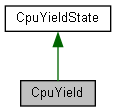Public Member Functions |
Static Public Member Functions |
Static Private Member Functions |
List of all members
CpuYield Class Reference
#include <cpuyield.h>
Inheritance diagram for CpuYield:

Public Member Functions | |
| CpuYield (const void *res=nullptr) | |
| ~CpuYield () | |
| void | Reset () |
| void | Pause () |
Static Public Member Functions | |
| static void | Wait (Int cnt) |
Static Private Member Functions | |
| static void | _mm_pause () |
Additional Inherited Members | |
 Protected Types inherited from CpuYieldState Protected Types inherited from CpuYieldState | |
| using | SwitchDelegate = void(*)(CpuYieldState *state, const void *resource) |
 Protected Attributes inherited from CpuYieldState Protected Attributes inherited from CpuYieldState | |
| Int32 | _count |
| Int32 | _loopSize |
| const void * | _resource |
 Static Protected Attributes inherited from CpuYieldState Static Protected Attributes inherited from CpuYieldState | |
| static const Int | LOOPS_START_COUNT |
| static const Int | LOOPS_MAX_GRANULARITY |
| static const Int | LOOPS_BEFORE_YIELD |
| static const Int | LOOPS_BEFORE_SLEEP |
| static const UInt | LOCK_ACQUIRE |
| static const UInt | LOCK_SPIN |
| static const UInt | LOCK_RELEASE |
| static const UInt | MAX_STATE_ENUM |
Constructor & Destructor Documentation
◆ CpuYield()
|
explicit |
- Parameters
-
[in] res The contended resource because of which Pause might have to be called. Might be a nullptr (but shouldn't).
◆ ~CpuYield()
| ~CpuYield | ( | ) |
Member Function Documentation
◆ Reset()
| void Reset | ( | ) |
◆ Pause()
| void Pause | ( | ) |
Pauses a little while until the contended resource hopefully becomes available again. Depending on the number of calls this will either just do a light spin loop or it might put the thread to sleep. Furthermore offending threads might be logged to diagnose deadlocks or bad performance.
◆ Wait()
|
static |
◆ _mm_pause()
|
staticprivate |